Didier Fassin Books
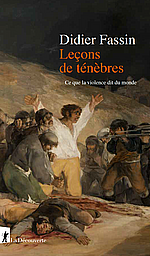
Leçons de ténèbres. Ce que la violence dit du monde, La Découverte, 2025, 324 pages.
La violence hante le monde. Présente dans le discours politique et la production artistique, dans l’espace public et les réseaux sociaux, elle ne cesse d’être questionnée, contestée, redéfinie, par la loi et le droit comme par les mobilisations sociales et le discours savant, dévoilant ses multiples dimensions, symbolique et structurelle, morale et psychique, de genre et d’État. Paradoxalement, toutefois, les sciences sociales n’ont commencé à l’analyser que tardivement. Inversement, les mythes et récits de ses origines ont sans cesse été réactualisés à des fins idéologiques, tandis que la psychanalyse, l’éthologie et la philosophie politique l’exploraient dans diverses perspectives généalogiques. Mais la violence n’est pas seulement un objet d’étude, elle est aussi une matière vivante dont s’emparent écrivains et cinéastes, juristes et témoins, militaires et militants. Son écriture et ses représentations interrogent les manières de la qualifier et de l’attester, la possibilité de la refuser ou au contraire de la défendre. En étudiant ses formes, il ne s’agit cependant pas d’en proposer une nouvelle théorie, mais d’appréhender ce que le monde dit de la violence et ce que la violence fait au monde.
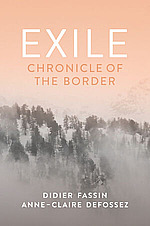
Exile: Chronicle of the Border, with Anne-Claire Defossez, Polity, 2025, 340 pages.
Men, women and children who flee political violence, religious persecution or poverty in their country and set off on journeys often lasting years may find themselves on dangerous routes where they face police brutality, gang rackets, confinement camps, barbed-wire fences, the rigors of the desert and the perils of the sea. Many lose their lives. Based on a five-year research in the Alps at the border between Italy and France, Didier Fassin and Anne-Claire Defossez study the experience of these migrants, the hazards they encounter, repression they endure, and the assistance they receive. They collected their poignant stories, participated in the activities of a shelter, took part in mountain rescue operations, interviewed politicians, policy makers and police officers. Their investigation reveals the ineffectiveness of the militarization of the border and the dismay of the police for the futility of their mission; it attests to the solidarity and commitment of volunteers; and it explores the form of life of exiles, which has become a defining feature of our time.
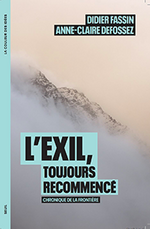
L'Exil, toujours recommencé. Chronique de la frontière, with Anne-Claire Defossez, Seuil, 2024, 448 pages.
Fuyant les violences politiques, les persécutions religieuses ou la pauvreté, des hommes, des femmes, des enfants du Moyen-Orient, du Maghreb et d’Afrique subsaharienne, se mettent en route pour des voyages de plusieurs années au cours desquels ils affrontent les rackets des bandes armées, les brutalités des polices, les camps d’enfermement, les murs de barbelés, les rigueurs du désert, les périls de la mer. Beaucoup y perdent la vie. S’appuyant sur une recherche conduite pendant cinq années, été comme hiver, à la frontière entre l’Italie et la France, dans les Alpes, le livre analyse l’expérience des exilés, l’engagement des volontaires et même le désarroi des forces de l’ordre, conscientes de la vanité de leur mission. Il dévoile l’inefficacité d’une militarisation de la frontière qui rend plus dangereuse la traversée de la montagne et d’une politique qui nie les droits de personnes en quête de protection.
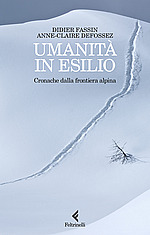
Umanità in Esilio. Cronache Dalla Frontiera Alpina, with Anne-Claire Defossez, 2024, Feltrinelli (trans. Lorenzo Alunni)
Fuggendo dalle violenze politiche, dalle persecuzioni religiose o dalla povertà, uomini, donne e bambini provenienti da Afghanistan, Iran, Siria, Maghreb e Africa subsahariana intraprendono viaggi di diversi anni durante i quali affrontano i racket delle bande armate, le brutalità delle forze di polizia, i campi di internamento, le barriere di filo spinato, le asperità del deserto e i pericoli del mare. Molti, in questo tentativo, perdono la vita.Per cinque anni, d’estate come d’inverno, Didier Fassin e Anne-Claire Defossez hanno condotto una ricerca al confine tra Italia e Francia, sulle Alpi. Hanno partecipato alle attività svolte per portare loro assistenza. Hanno incontrato i vari attori di questo territorio di migrazioni millenarie. La loro indagine permette di comprendere l’esperienza degli esuli, l’impegno dei volontari, la solidarietà dei cittadini della frontiera e, persino, lo smarrimento delle forze dell’ordine, consapevoli di trovarsi di fronte a migrazioni epocali. Umanità in esilio è un grande resoconto che spiega al meglio le complesse dinamiche locali e globali della migrazione contemporanea.
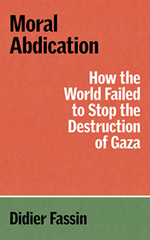
Moral Abdication. How the World Failed to Stop the Destruction of Gaza, Verso, 128 pages.
Providing a record of the first six months of the war waged by the Israeli army after the 7 October attacks and drawing on a rich range of international sources, the book examines how most Western governments have acquiesced in and often contributed to the destruction, by the Israeli army, of Gaza, its homes, infrastructures, hospitals, institutions of education, and civilian population. To justify their support and prevent criticism, they have provided an official version of the events largely taken up by mainstream media. Dissenting voices were silenced. A policing of language and thought was imposed. Censorship and self-censorship became normalized. Exploring the multiple dimensions of the extreme inequality of lives between the two sides of the conflict and analyzing the complex geopolitical, economic and ideological stakes that underlie it, the book constitutes an archive of this moral abdication.
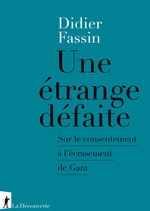
Une étrange défaite. Sur le consentement à l’écrasement de Gaza, La Découverte, 198 pages.
Avec le recul du temps, les événements qui, après l'attaque meurtrière du Hamas le 7 octobre 2023, se sont déroulés en Palestine et leur réception dans une grande partie des lieux de pouvoir, tant politiques qu'intellectuels, de la planète apparaîtront à la lumière crue de leur signification : plus que l'abandon d'une partie de l'humanité, dont la réalpolitique internationale a donné maints exemples récents, c'est le soutien apporté à sa destruction que retiendra l'histoire. Cet acquiescement à la dévastation de Gaza et au massacre de sa population par l'État d'Israël a suscité l'indignation de celles et ceux qui, tout en condamnant les actes sanglants ayant déclenché l'offensive, rappelaient les décennies de spoliation, de violence et d'humiliation qui les avait précédés et refusaient la poursuite de l'écrasement d'un peuple et de l'effacement de sa mémoire. Mais on les a stigmatisés et réprimés. Une police de la pensée s'est imposée. Ce livre propose une archive et une analyse de cette abdication morale.
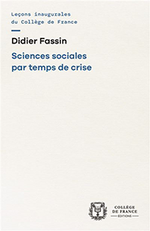
Sciences sociales par temps de crise, Collège de France, 2023, 54 pages
Si les sciences sociales peuvent aider à comprendre et résoudre les multiples situations critiques auxquelles fait face le monde contemporain, leur rôle est également d'interroger le langage de la crise, d'analyser l'écart ou la convergence entre la réalité et sa représentation : nommer ou taire une crise, l'exagérer ou la minimiser sont autant de procédés générateurs d'affects, de temporalités, d'omissions aux conséquences majeures qu'une pensée critique se doit de décrypter. En s'appuyant à la fois sur les parcours de vie de figures célèbres des sciences humaines et sur des recherches conduites autour de faits éloquents du présent, cette leçon inaugurale pose les jalons d'une vaste réflexion éthique et politique dont l'époque ne cesse de démontrer la nécessité.
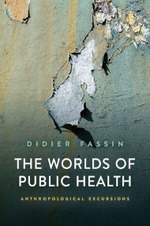
The Worlds of Public Health: Anthropological Excursions, Polity, 2023, 272 pages.
The Worlds of Public Health analyzes the moral and political issues at stake in the practice of public health today, including the influence of positivism, the boundaries of disease, conspiracy theories, morality tests, and the challenges posed by the health of migrants and prisoners. This exploration transports readers from South Africa, the country most impacted by the AIDS epidemic, to Ecuador, with the supposedly highest maternal mortality rate in Latin America; from the scientific controversies concerning the so-called worm wars in Kenya to conflicts between doctors and patients around Gulf War syndrome in the United States; from lead poisoning and public housing in France to the Covid-19 pandemic worldwide. Through these case studies, Didier Fassin argues that, ultimately, public health is a politics of life.
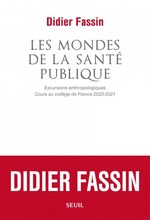
Les Mondes de la santé publique; Excursions anthropologiques, Seuil, 2021, 400 pages
Avec la pandémie de covid, la santé publique, domaine jusqu’alors méconnu, a fait irruption dans le monde. Le cours au Collège de France propose un détour en partant d’une scène ordinaire, celle du saturnisme infantile, pour en décliner les enjeux à travers une série d’études de cas menées sur trois continents. La vérité du chiffre invite à réfléchir à la manière dont le travail de quantification prétend représenter les faits sociaux et sanitaires. Les frontières épistémiques interrogent la confrontation de conceptions profanes et savantes de la maladie. Les thèses conspirationnistes révèlent des réactions de défiance à l’égard des savoirs autorisés et des pouvoirs officiels. Les crises éthiques dévoilent des mécanismes de violation des droits et de détournement des biens communs au bénéfice d’intérêts privés. Quant aux enquêtes portant sur les exils précaires et les épreuves carcérales, elles permettent d’appréhender la généalogie et la sociologie de l’administration des populations vulnérables. Chacun de ces enjeux jette un éclairage singulier sur l’expérience pandémique. La santé publique apparaît ainsi à la fois comme un miroir tendu à la société et un reflet que cette dernière lui renvoie.
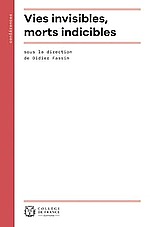
Vies invisibles, morts indicibles, Collège de France, 2022, 144 pages.
Comment traite-t-on les vies ? Que fait-on des morts ? Ou plutôt, que dit d’une société la manière dont elle considère certaines vies, vies de travailleurs, vies d’exilés, vies de prisonniers, vies rendues vulnérables, inégales ? Et que révèlent de ses valeurs la façon dont meurent certains de ces travailleurs, certains de ces exilés ou certains de ces prisonniers, la façon dont on les laisse mourir ou dont on les expose à la mort, la façon dont on détourne les yeux de leur condition ou dont on se mobilise pour les protéger ? Au fond, comment se définissent les économies morales de la vie et de la mort dans le monde contemporain ? Telles sont les questions posées dans ce livre.
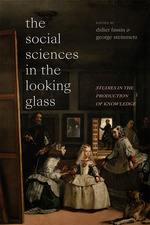
The Social Sciences in the Looking-Glass. Studies in the Production of Knowledge (editorwith George Steinmetz), Duke University Press, 2023, 416 pages.
In recent years, social scientists have turned their critical lens on the historical roots and contours of their disciplines, including their politics and practices, epistemologies and methods, institutionalization and professionalization, national development and colonial expansion, globalization and local contestations, and public presence and role in society. The Social Sciences in the Looking Glass offers current social scientific perspectives on this reflexive moment. The volume’s contributors outline the present transformations of the social sciences, explore their connections with critical humanities, analyze the challenges of alternate paradigms, and interrogate recent endeavors to move beyond the human.
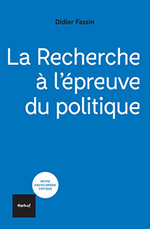
La Recherche à l’épreuve du politique. Tribulations ethnographiques, Textuel, 2023, 80 pages.
L’ethnographie, entendue comme enquête de terrain et travail d’écriture, est une épreuve à risque. Sous les régimes autoritaires, des chercheuses et des chercheurs sont menacés, emprisonnés, assassinés. Mais dans les démocraties ils ne sont pas à l'abri des pressions de l’État. À partir d’exemples récents, le livre décrypte les risques auxquels s’exposent chercheuses et chercheurs en sciences sociales, notamment lorsqu’ils dévoilent l’arbitraire de l’ordre établi. S’appuyant sur l'expérience des pratiques d’intimidation policière à l’encontre de volontaires portant assistance à des exilés en haute montagne et des complications légales liées à une enquête sur la mort d’un voyageur tué par une unité d’élite de la gendarmerie, il plaide pour la liberté de la recherche sans éluder la responsabilité de celles et ceux qui la conduisent.
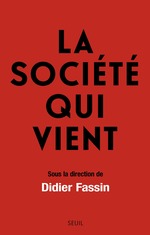
La Société qui vient (editor), Seuil, 2022, 1,344 pages.
Au fil des ans, les crises semblent se multiplier. La crise deviendrait-elle la nouvelle normalité du monde contemporain, au risque de ne susciter de réponses que dans l’urgence ? Le choix fait dans ce livre est de parler plutôt de moment critique appelant une réflexion collective attentive aux grandes questions du temps présent comme prélude à d’autres formes de vie. Chaque section ouvre des perspectives sur les principaux enjeux auxquels la société française doit faire face, les lignes politiques qui la traversent, les mondes sociaux qui s’y côtoient, les inégalités qui la divisent, les reconnaissances qui en enrichissent la compréhension et les explorations en quête d’alternatives. Ni état des lieux ni exercice de futurologie, ce livre est une interrogation critique sur notre temps pour anticiper la société qui vient.
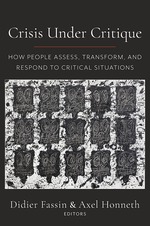
Crisis Under Critique. How People Assess, Transform, and Respond to Critical Situations (editor with Axel Honneth), Columbia University Press, 2022, 456 pages. Our political vocabulary today is suffused with the rhetoric of crisis, to the point that supposed abnormalities have been normalized. How can the notion of crisis be rethought in order to take stock of—and challenge—our understanding of the many predicaments in which we find ourselves? Instead of diagnosing emergencies, Didier Fassin, Axel Honneth, and an assembly of leading thinkers examine how people experience, interpret, and contribute to the making of and the response to critical situations. Considering social movements, intellectual engagements, affected communities, and reflexive perspectives, the book foregrounds the perspectives of those most closely involved, bringing out the immediacy of crisis. |
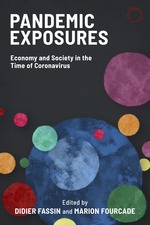
Pandemic Exposures: Economy and Society in the Time of Coronavirus (editor with Marion Fourcade), Hau Books, 2021, 474 pages.
For people and governments around the world, the onset of the COVID-19 pandemic seemed to place the preservation of human life at odds with the pursuit of economic and social life. Yet this simple alternative belies the complexity of the entanglements the crisis has created and revealed not just between health and wealth but also around morality, knowledge, governance, culture, and everyday subsistence. The editors have assembled an eminent team of scholars from across the social sciences conducting research on six continents to reflect on the multiple ways the coronavirus has entered, reshaped, or exacerbated existing trends and structures in every part of the globe.
Free download.
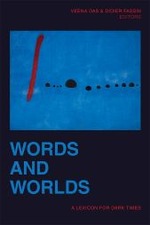
Words and Worlds: A Lexicon for Dark Times (editor with Veena Das), Duke University Press, 2021, 328 pages.
Born in a time of anxiety, Words and Worlds examines some of the disquieting challenges that societies now face. Through an inquiry into a political lexicon of commonsense words, ranging from democracy and revolution to knowledge and authority, from inequality and toleration to war and power, the contributors to this book trouble the self-evidence of these terms, bringing into view the hidden transcripts and unexpected trajectories of many settled ideas, such as the human sense of belonging or the call for openness and transparency in research and public life. The case studies conducted over five continents with the tools of eight different disciplines challenge the ethnocentric assumptions, false moralism, and cultural prejudices that underlie much discussion on corruption or even the virtue invested in resilience. Together the essays offer a fresh look at the deeply connected worlds we inhabit in solidarity and in discord.
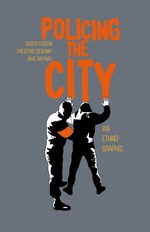
Policing the City. An Ethno-graphic (with Frédéric Debomy and Jake Raynal), Other Press, 2022, 112 pages.
What we know about the forces of law and order often comes from tragic episodes that make the headlines, or from sensationalized versions for film and television. These gripping accounts obscure two crucial aspects of police work: the tedium of everyday patrols under constant pressure to meet quotas, and the banality of racial discrimination and ordinary violence. Based on a fifteen-month ethnography of the daily life of an anticrime squad in one of the largest precincts in the Paris region, this “ethno-graphic” explores the genre, still little used in the social sciences, of the cartoon both to experiment new forms and to reach new publics.

La Force de l’ordre. Une enquête ethno-graphique (with Frédéric Debomy and Jake Raynal), Seuil/Delcourt, 2020, 100 pages.
Des relations entre les forces de l'ordre et les quartiers populaires, on ne connaît souvent que les épisodes dramatiques qui font la une des médias. Mais quelles sont leurs interactions quotidiennes ? Pendant quinze mois, l'anthropologue Didier Fassin a partagé la vie d'un grand commissariat de la région parisienne, et plus particulièrement des BAC, les brigades anti-criminalité. À sa parution, son livre a suscité un vif débat sur l'exception sécuritaire à laquelle est soumise une partie de la population française. Près d'une décennie plus tard, avec Jake Raynal et Frédéric Debomy, il remet l'ouvrage sur le métier à travers une « enquête ethno-graphique », racontant l'ordinaire sans relief des patrouilles et montrant que les pratiques policières visent moins à protéger l'ordre publie qu'un certain ordre social. Cette œuvre de re-création par le dessin, éclaire de manière saisissante les enjeux contemporains autour des violences et du racisme au sein des forces de l'ordre.
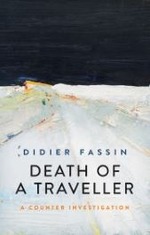
Death of a Traveller: A Counter Investigation, Polity, 2021, 160 pages.
It is a simple story. A 37-year-old man belonging to the Traveller community is shot dead by a special unit of the French police on the family farm where he was hiding since he failed to return to prison after temporary release. The officers claim self-defense. The relatives, present at the scene, contest that claim. A case is opened, and it concludes with a dismissal that is upheld on appeal. Dismayed by these decisions, the family continues the struggle for truth and justice. Giving each account of the event the same credit, Didier Fassin conducts a counter-investigation, based on the re-examination of all the available details and on the interviews of its protagonists. A critical reflection on the work of police forces, the functioning of the justice system, and the conditions that make such tragedies possible and seldom punished, Death of a Traveller is also an attempt to restore to these marginalized communities what they are usually denied: respectability.
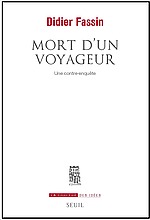
Mort d’un voyageur. Une contre-enquête, Seuil, 2020, 160 pages.
C’est une histoire simple. Un homme de trente-sept ans appartenant à la communauté du voyage est abattu dans la ferme familiale par des gendarmes du GIGN alors qu’il n’a pas réintégré la prison après une permission de sortir. Deux versions des faits s’affrontent : celle des militaires, qui invoquent la légitime défense, et celle des parents présents sur les lieux, qui la contestent. Une information judiciaire est ouverte, qui se conclut par un non-lieu, confirmé en appel. La famille et ses soutiens continuent pourtant de se battre, réclamant justice et vérité. Réexaminant les pièces du dossier et interrogeant les protagonistes du drame, Didier Fassin présente ici une contre-enquête qui accorde le même crédit à tous les récits. Pour en rendre compte, Mort d’un voyageur propose une forme d’écriture expérimentale qui s’attache d’abord à restituer scrupuleusement par une écriture subjective la manière dont chacun affirme avoir vécu les événements, puis à croiser les témoignages et les expertises en intégrant l’ensemble des éléments disponibles pour aboutir à une autre lecture des faits. Réflexion critique sur les conditions de possibilité de telles tragédies, cette recherche contribue à rendre aux voyageurs un peu de ce dont la société les prive : la respectabilité.
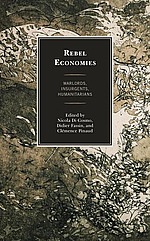
Rebel Economies: Warlords, Insurgents, Humanitarians (editor with Nicola Di Cosmo and Clémence Pinaud), Rowman & Littlefield, 2021, 290 pages.
As a pervasive occurrence in the contemporary world, wars and their economic sources are defining social and political processes in a variety of national and transnational contexts. Rebel Economies explores historical, anthropological and political dimensions of war economies by non-state actors across different periods and regions, while presenting their multiple manifestations within a single, congruent framework. Through a variety of conceptual and disciplinary approaches, the authors investigate, in the past and present and across three continents, the nexuses between economy, war, social transformation and state-building, revealing in the process differences and similarities that would otherwise remain hidden.

De l’inégalité des vies, Fayard, 2020, 66 pages.
Il y a, d’un côté, la vie qui s’écoule avec un commencement et une fin, et de l’autre, la vie qui fait la ingularité humaine parce qu’elle peut être racontée. On pourrait ainsi parler de vie biologique et de vie biographique. L’espérance de vie mesure l’étendue de la première. L’histoire de vie relate la richesse de la seconde.
L’inégalité des vies ne peut être appréhendée que dans la reconnaissance des deux. Elle doit à la fois les distinguer et les connecter. Les distinguer, car le paradoxe des femmes françaises montre qu’une vie longue ne suffit pas à garantir une vie bonne. Les connecter, car l’expérience des hommes afro-américains rappelle qu’une vie dévalorisée finit par produire une vie abîmée. C’est ainsi que se pose également la question des réfugiés et des migrants.
English version in open access
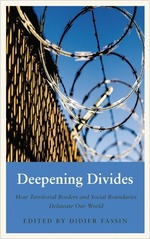
Deepening Divides: How Territorial Borders and Social Boundaries Delineate Our World (editor), Pluto Press, 2019, 258 pages.
It is usually considered that borders and boundaries can easily be distinguished, the former enforcing the territories of states, whereas the latter mark social differences between groups. The two entities are, however, increasingly interconnected. Thus, the refugee crises in Europe, the United States, the Middle East, and elsewhere, reveal how racial, ethnic and religious boundaries serve to justify the strengthening of state borders – regardless of the human cost. Similarly, less tragic situations in which immigration and discrimination are intertwined show that borders and boundaries are best understood through their relationship to one another. Deepening Divides explores this relationship from various theoretical perspectives and within different national contexts, with case studies covering five continents.
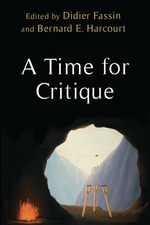
A Time for Critique(editor withBernard E. Harcourt), Columbia University Press, 2019, 320 pages. |
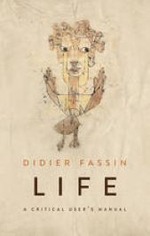
Life. A Critical User's Manual, Polity, 2018, 150 pages.
How can we think of life in its dual expression, matter and experience, the living and the lived? Philosophers and, more recently, social scientists have offered multiple answers to this question, often privileging one expression or the other – the biological or the biographical. But is it possible to conceive of them together and thus reconcile naturalist and humanist approaches? Using research conducted on three continents and drawing on the ideas of Wittgenstein, Benjamin and Foucault, Didier Fassin attempts to do so by developing three concepts: forms of life, ethics of life and politics of life. In the conditions of refugees and asylum-seekers, through humanitarian gestures and sacrifices for a cause, in light of mortality statistics and death benefits, and via a genealogical and ethnographical inquiry, the moral economy of life reveals troubling tensions in the way contemporary societies treat human beings. Once the pieces of this anthropological composition are assembled, like in Georges Perec’s jigsaw puzzle, an image appears: that of unequal lives.
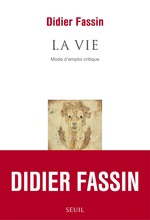
La vie. Mode d'emploi critique, Seuil, Paris, 2018, 192 pages.
Comment concevoir la vie dans sa double dimension du vivant et du vécu, de la matière et de l’expérience ? À cette question, la philosophie et, plus récemment, les sciences sociales, ont apporté toutes sortes de réponses, privilégiant souvent l’une ou l’autre de ces dimensions – le biologique ou le biographique. Est-il toutefois possible de les penser ensemble et de réconcilier ainsi les approches naturaliste et humaniste ? S’appuyant sur une série de recherches conduites sur trois continents, l'auteur s’y emploie en mobilisant trois concepts : les formes de vie, les éthiques de la vie et les politiques de la vie. Dans la condition des réfugiés et des demandeurs d’asile, à travers le geste humanitaire et le sacrifice pour une cause, à la lumière des statistiques de mortalité et des modalités de calcul des indemnités de décès, à l’épreuve, enfin, d’une enquête généalogique et ethnographique, l’économie morale de la vie révèle de troublantes tensions dans la manière dont les sociétés contemporaines traitent les êtres humains. Une fois assemblées, comme dans un puzzle, les pièces de cette composition anthropologique, une image apparaît : celle, troublante, des vies inégales.
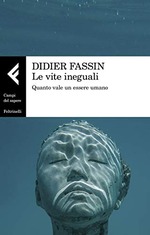
Le vite ineguali. Quanto vale un essere umano, Feltrinelli Editore, Milan, 2019, 208 pages, translated by Lorenzo Alunni.
Come può la vita essere concepita nella sua duplice dimensione del vivente e del vissuto, della materia e dell’esperienza? A questa domanda, la filosofia e, più recentemente, le scienze sociali, hanno portato ogni tipo di risposta, spesso favorendo l’una o l’altra di queste dimensioni: quella biologica o quella biografica. Tuttavia, è possibile pensarli insieme e riconciliare gli approcci naturalistici e umanistici? La scommessa di Didier Fassin è uscire dall’astrazione dei concetti filosofici per tentarne una verifica empirica e rivelare quindi qualcosa di concreto, capace di interrogare la sociologia e la politica. Fassin unisce critica filosofica e ricerca etnografica sul terreno e mostra che negli ultimi decenni la vita biologica ha preso un assoluto sopravvento gerarchico su quella biografica. Se oggi si concede facilmente un permesso di soggiorno per ragioni sanitarie mentre è molto più difficile ottenere un diritto d’asilo, è perché della vita si sacralizza la sua dimensione impolitica. Ma non tutte le vite si equivalgono (neri d’America, stranieri e migranti, richiedenti asilo), e lo dimostra empiricamente la differenziazione liberista del valore, cioè del prezzo, che emerge ad esempio nel rimborso delle vittime di omicidi, incidenti eccetera. Una volta assemblati, come in un puzzle, i pezzi di questa composizione antropologica, appare dunque un’immagine: quella inquietante delle vite ineguali.

Das Leben. Eine kritische Gebrauchsanweisung,Suhrkamp, Berlin, 2017, 191 pages, translated by Christine Pries.
How to think of life in it is dual expression, matter and experience, the living and the lived? Philosophers and, more recently, social scientists have offered multiple answers to this question, often privileging one expression or the other – the biological or the biographical. But is it possible to conceive of them together and thus reconcile naturalist and humanist approaches? Using a series of research conducted on three continents, Didier Fassin attempts to do so by mobilizing three concepts: forms of life, ethics of life and politics of life. In the condition of refugees and asylum-seekers, through the humanitarian gesture and the sacrifice for a cause, in light of mortality statistics and death benefits, and via a genealogical and ethnographical inquiry, the moral economy of life reveals troubling tensions in the way contemporary societies treat human beings. Once the pieces of this anthropological composition assembled, like in Georges Perec’s jigsaw puzzle, an image appears: that of unequal lives.

The Will to Punish, Oxford University Press, 2018, 208 pages.
Over the last few decades, most societies have become more repressive, their laws more relentless, their magistrates more inflexible, independently of the evolution of crime. In The Will to Punish, using an approach both genealogical and ethnographic, distinguished anthropologist Didier Fassin addresses the major issues raised by this punitive moment through an inquiry into the very foundations of punishment. What is punishment? Why punish? Who is punished? Through these three questions, he initiates a critical dialogue with moral philosophy and legal theory on the definition, the justification and the distribution of punishment. Discussing various historical and national contexts, mobilizing a ten-year research program on police, justice and prison, and taking up the legacy of Friedrich Nietzsche and Michel Foucault, he shows that the link between crime and punishment is an historical artifact, that the response to crime has not always been the infliction of pain, that punishment does not only proceed from rational logics used to legitimize it, and that more severity in sentencing often means increasing social inequality before the law.
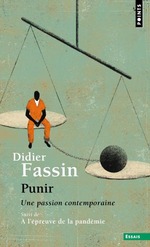
Punir. Une passion contemporaine, Seuil, Paris, 2017, 201 pages. Second edition with postface 2020.
Au cours des dernières décennies, la plupart des sociétés se sont faites plus répressives, leurs lois plus sévères, leurs juges plus inflexibles, et ceci sans lien direct avec l’évolution de la délinquance et de la criminalité. Dans ce livre, qui met en œuvre une approche à la fois généalogique et ethnographique, l'auteur s’efforce de saisir les enjeux de ce moment punitif en repartant des fondements mêmes du châtiment. Qu’est-ce que punir ? Pourquoi punit-on ? Qui punit-on ? À travers ces trois questions, il engage un dialogue critique avec la philosophie morale et la théorie juridique. Puisant ses illustrations dans des contextes historiques et nationaux variés, il montre notamment que la réponse au crime n’a pas toujours été associée à l’infliction d’une souffrance, que le châtiment ne procède pas seulement des logiques rationnelles servant à le légitimer et que l’alourdissement des peines a souvent pour résultat de les différencier socialement, et donc d’accroître les inégalités. À rebours du populisme pénal triomphant, cette enquête propose une salutaire révision des présupposés qui nourrissent la passion de punir et invite à repenser la place du châtiment dans le monde contemporain.

Der Wille zum Strafen, Suhrkamp Verlag, Berlin, 2018, 206 pages, translated by Christine Pries.
In den letzten Jahrzehnten lässt sich ein härteres Durchgreifen der Polizei, eine Verschärfung des Strafrechts und ein teils massiver Anstieg der Gefangenenzahle in allen liberalen Demokratien beobachten. Ein neuer Wille zum Strafen greift um sich, wie Didier Fassin in seinem brisanten Buch nachweist. Um dieses Moment des Strafen zu verstehen, geht Fassin drei zentralen Fragen nach: Was ist Strafen? Warum strafen wir? Und wen bestrafen wir? Anhand zahlreicher Fallbeispiele vergleicht er die faktische Praxis des Strafens mit klassischen Theorien des liberalen Rechtsstaats und zieht historische sowie ethnologische Forschungen zu anderen Kulturen des Strafens heran. Es zeigt sich: Die realen Strafpraktiken weichen stark von den liberalen Idealvorstellungen ab. Sie geben den Blick frei auf einen hochgradig ungerechten und diskriminierenden Repressionsapparat, der die dunkle Seite der gegenwärtigen neoliberalen Gesellschaften bildet, mit deren Siegeszug er zeitlich und geographisch korreliert. Ein auf ethnographischer Forschung sowie theoretischen Einsichten basierendes und zugleich in seinen Fallgeschichten erschütterndes Buch.
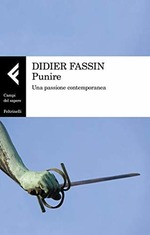
Punire, Feltrinelli Editore, Milan, 2018, 134 pages, translated by Lorenzo Alunni.
Negli ultimi decenni le nostre società sono diventate più repressive, le leggi più severe, i giudici più rigidi, e questo senza che ci sia alcun legame diretto con la criminalità. Didier Fassin si sforza di cogliere, con un’analisi genealogica ed etnografica, la posta in gioco di questo momento punitivo. Per farlo, è necessario aggiornare quello che sappiamo sulla stessa “strana pratica, e la singolare pretesa, di rinchiudere per correggere, avanzata dai codici moderni” di cui parlava Foucault. Quella nuova tecnologia chiamata punizione. Che cosa c’è da punire? Perché abbiamo bisogno di imporre punizioni? E contro chi? Queste tre domande disegnano il campo di un dialogo critico tra la filosofia morale e le teorie del diritto. Con un’indagine sulle diverse configurazioni della punizione nella storia e nelle nazioni, Fassin mostra che non sempre il crimine è stato disciplinato da sofferenze inflitte per legge e che non necessariamente la punizione appartiene a logiche razionali, usate per legittimarla. Per di più, l’inasprimento delle pene e la disuguaglianza nella loro distribuzione rendono la società meno sicura e meno giusta. Quello di Fassin è un saggio attualissimo in tempi di trionfo del populismo, perché offre gli strumenti per una revisione delle premesse che alimentano la passione punitiva e invita a ripensare la sua collocazione nel mondo contemporaneo.
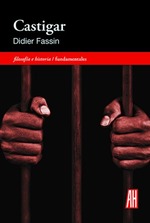
Castigar. Una passion contemporánea, Quelibroleo, Buenos Aires, 2018, 261 pages, translated by Antonio Oviedo.
En este libro, Didier Fassin se propone comprender el momento punitivo. Para eso parte de una triple interrogación al fundamento del castigo: ¿Qué es castigar? ¿Por qué se castiga? ¿A quién se castiga? A través de estas preguntas sobre la definición, la justificación y la distribución del castigo, el autor entabla un diálogo crítico con la filosofía y con el derecho. A los enfoques normativos opone un recorrido genealógico y etnográfico. Cuando explora diferentes contextos históricos y nacionales, muestra que el crimen y el castigo no siempre, ni en todas partes, están asociados; que las infracciones a la ley no siempre han dado lugar a la imposición de una pena; que el castigo no deriva únicamente de lógicas racionales, sino también de un principio de placer; y que, finalmente, una mayor severidad de la justicia genera más inseguridad y más desigualdad.
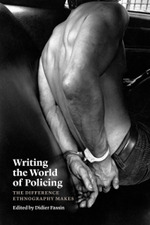
Writing the World of Policing. The Difference Ethnography Makes (editor), The University of Chicago Press, Chicago, 2017, 320 pages.
As policing has recently become a major topic of public debate, it was also a growing area of ethnographic research. This collective volume brings together an international roster of scholars who have conducted fieldwork studies of law enforcement in disadvantaged urban neighborhoods on five continents. How, they ask, can ethnography illuminate the role of the police in society? Are there important aspects of policing that are not captured through interviews and statistics? And how can the study of law enforcement shed light on the practice of ethnography? What might studying policing teach us about the epistemological and ethical challenges of participant observation? Beyond these questions of crucial interest for criminology and, more generally, the social sciences, the book provides a timely discussion of one of the most problematic institutions in contemporary society.
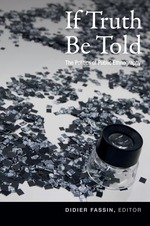
If Truth Be Told. The Politics of Public Ethnography (editor), Duke University Press, Durham, 2017, 348 pages.
What happens when ethnographers go public via books, opinion papers, media interviews, court testimonies, policy recommendations, or advocacy activities? Calling for a consideration of this public moment as part and parcel of the research process, the contributors to If Truth Be Told explore the challenges, difficulties, and stakes of having ethnographic research encounter with various publics, ranging from journalists, legal experts, policy-makers, activist groups, local populations, and other scholars. With case studies from five continents, this collection signals the global impact of the questions that the publicization of ethnography raises about the public sphere, the role of the academy, and the responsibilities of social scientists.

Le Monde à l’épreuve de l’asile. Essai d’anthropologie critique, Société d’ethnologie, Paris, 2017, 33 pages.
The refugee problem, which has been acute in the past century, has gone through tragic developments in recent years due to an increase in both the affected population and the hostility against them. Based on fifteen years of research in France and more recently South Africa, the book proposes to reconsider what we think we know but are not able to reflect on any more with respect to the “refugee question” through a triple approach: genealogical, to explore the origins of asylum; geographical, to account for the globalization of its stakes; ethnographic, to examine the ordinary practice of protection granting. It thus reveals intermittent hospitality, the unequal burden of refugees among nations and the profound mutations of the moral economy of asylum.
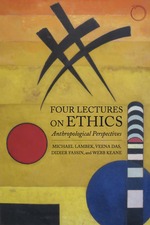
Four Lectures on Ethics. Anthropological Perspectives(with Veena Das, Michael Lambek and Webb Keane), Hau Books, Chicago, 2015, 220 pages.
Responding to the challenges from the worlds they study and reflecting critically on their own practice, anthropologists have recently devoted new attention to ethics and morality. This masterclass brings together four scholars working in this field—Michael Lambek, Veena Das, Didier Fassin, and Webb Keane—to discuss, in a lecture format, the way in which anthropology faces contemporary ethical issues and moral problems. Rather than treating ethics as an object or as an isolable domain in moral theory, the authors are interested in grasping how the ethical and the moral emerge from social actions and interactions, how they are related to historical contexts and cultural settings, how they are transformed through their confrontation with the political, and how they are, ultimately, an integral part of life. Contrasting in their perspectives and methods, but developing a lively conversation, this masterclass provides four distinct voices to compose an anthropology of the ethical and the moral.

Prison Worlds. An Ethnography of the Carceral Condition, Polity, Cambridge, 2016, 400 pages,translated by Rachel Gomme.
The prison is a recent invention, yet it has become the universal system of punishment. How can we understand the place that the correctional system occupies in contemporary societies? What are the experiences of those who are incarcerated as well as those who work there? To answer these questions, the author conducted a four-year-long study in a French short-stay prison, following inmates from their trial to their release. He shows how the widespread use of imprisonment has reinforced social and racial inequalities, and analyzes the concerns and compromises of the correctional staff, the hardships and resistance of the inmates, and the ways in which life on the inside intersects with life on the outside. In the end, the carceral condition appears to be irreducible to other forms of penalty both because of the chain of privations it entails and because of the experience of meaninglessness it comprises. Examined through ethnographic lenses, prison worlds are thus both a reflection of society and its mirror.
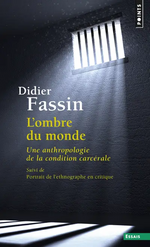
L'Ombre du monde. Une anthropologie de la condition carcérale, Seuil, Paris, 2015, 612 pages. Second edition with postface 2017.
Invention récente puisqu’elle n’a guère plus de deux siècles, la prison est devenue, partout dans le monde, la peine de référence. L’atteste, en France, le doublement de la population carcérale au cours des trois dernières décennies. Comment comprendre la place qu’elle occupe dans la société contemporaine ? Et quelle expérience en ont ceux qui y sont enfermés et ceux qui y travaillent ? Pour tenter de répondre à ces questions, cet ouvrage s'appuie sur une enquête dans une maison d’arrêt conduite au long de quatre années. Suivant les parcours d’hommes de leur jugement jusqu'à leur sortie, il analyse l’ordinaire de la condition carcérale. Il montre comment la banalisation de l’enfermement a renforcé les inégalités socio-raciales et comment les avancées des droits se heurtent aux logiques d’ordre et aux pratiques sécuritaires. Mais il analyse aussi les attentions et les accommodements du personnel pénitentiaire, les souffrances et les micro-résistances des détenus, la manière dont la vie au dedans est traversée par la vie du dehors. La prison apparaît ainsi comme à la fois le reflet de la société et le miroir dans lequel elle se réfléchit.
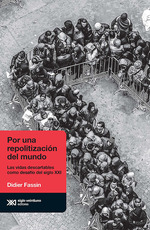
Por una repolitización del mundo. Las vidas descartables como desafío del siglo xxi, Siglo XXI, Buenos Aires, 2018, 232 pages, translated by Horacio Pons.
Extranjeros, refugiados, indocumentados y desempleados ponen un mayor desafío al orden moral que hoy enfrentan las sociedades occidentales. ¿Quiénes tienen hoy derecho a una existencia digna? ¿Cómo trazan los poderes públicos la frontera entre los que se salvan y los condenados a la expulsión? ¿Cuáles son los límites de lo que una sociedad admite como tolerable? A través de las respuestas a estas preguntas, el autor se propone devolver un sentido pleno a la política, que actualmente genera decepción y cuestionamiento. Los trabajos de campo que realizó en tres continentes le permiten demostrar cómo, cada vez más, las desigualdades se inscriben en los cuerpos de las personas en términos de sufrimiento, los hechos de violencia se reinterpretan en el léxico del trauma y el pedido de justicia social se transforma en llamado a la compasión. Así, este libro se vale de las herramientas más eficaces de las ciencias humanas y sociales para demostrar que la moral es también un asunto político.
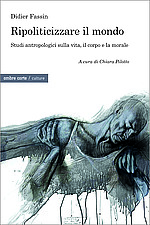
Ripoliticizzare il mondo, Ombre Corte,Verona, 2014, 140 pages, translated by Chiara Pilotto.
In un tempo in cui, ovunque nel mondo, i cittadini esprimono in maniera crescente il loro disincantamento dalla politica, è necessario reinterrogarne il senso non dal punto di vista delle istituzioni, dei partiti e dei programmi che le danno forma, ma nei termini di ciò che ne costituisce la sostanza stessa, ciò a cui essa rimanda e ciò che mette in gioco. Nutriti da ricerche condotte in più continenti, i saggi presentati in questo volume affrontano tale questione attraverso tre dimensioni fondamentali: le politiche della vita, del corpo e della morale, analizzate alla luce di ricerche sulla povertà e l’immigrazione, l’asilo e la malattia, la giustizia sociale e la ragione umanitaria, disegnano così il progetto di ripoliticizzare il mondo. At a time when people in many parts of the world are voicing their disillusionment with politics, it becomes necessary to question the very meaning of the concept, not from the perspective of institutions, parties, and platforms, but in terms of substance, purpose, and issues. The fruit of research conducted on three continents, the essays examine three dimensions of this question: the politics of lives, of bodies, and of morals. Their analysis through case studies concerning poverty and immigration, asylum and disease, social justice and humanitarian reason thus outlines the project to re-politicize the world.
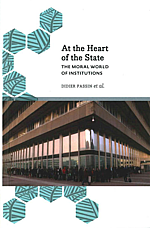
At the Heart of the State: The Moral World of Institutions(with Yasmine Bouagga, Isabelle Coutant, Jean-Sébastien Eideliman, Fabrice Fernandez, Nicolas Fischer, Carolina Kobelinsky, Chowra Makaremi, Sarah Mazouz, Sébastien Roux), Pluto Press, London, 2015, 288 pages, translated by Patrick Brown and Didier Fassin.
The state is often regarded as a neutral bureaucratic entity. Against this, At the Heart of the State argues that it is also a concrete and situated reality, embodied in the work of its agents and inscribed in the issues of its time. The result of a five-year investigation by ten scholars, this book describes and analyzes the police, the court system, the prison apparatus, social services, and mental health facilities. Carried out in France, the study illuminates questions regarding state institutions in general. Combining genealogy and ethnography, the authors show how these institutions do not simply implement laws, rules and procedures: they mobilize values and affects, judgements and emotions. In other words, they reflect the morality of the state.
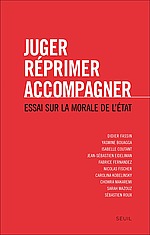
Juger, réprimer, accompagner. Essai sur la morale de l’État (with Yasmine Bouagga, Isabelle Coutant, Jean-Sébastien Eideliman, Fabrice Fernandez, Nicolas Fischer, Carolina Kobelinsky, Chowra Makaremi, Sarah Mazouz, Sébastien Roux), Le Seuil, Paris, 2013, 412 pages.
L’État est souvent représenté comme une entité bureaucratique abstraite et neutre. Or, il se constitue à travers des discours, des pratiques et des relations qui en font une réalité concrète et située, s’incarnant dans le travail de ses agents et s’inscrivant dans les enjeux de son temps. C’est ce que montre cet ouvrage qui, produit d’une enquête de cinq années, décrit et analyse le fonctionnement de la police, de la justice, de la prison, des services sociaux et de la santé mentale. Ces institutions ne sont certes pas tout l’État, mais elles ont affaire, en large part, aux mêmes publics issus de milieux populaires, d’origine immigrée ou appartenant à des minorités.Au fil d’une étude qui associe généalogie et ethnographie, il apparaît que la prise en charge de ces populations procède, au sommet du pouvoir comme dans le quotidien des interactions, non seulement de l’application de règles et de procédures, mais aussi de la mobilisation de valeurs et d’affects, de jugements formulés sur des groupes ou des personnes, et d’émotions ressenties devant des situations ou des actes : elle exprime la morale de l’État.
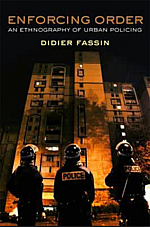
Enforcing Order: An Ethnography of Urban Policing, Polity, Cambridge, 2013, 320 pages, translated by Rachel Gomme.
Most incidents of urban unrest in recent decades – including the riots in France, Britain and other Western countries – have followed lethal interactions between the youth and the police. Usually these take place in disadvantaged neighborhoods composed of working-class families of immigrant origin or belonging to ethnic minorities. These tragic events have received a great deal of media coverage, but we know very little about the everyday activities of urban policing that lie behind them. Over the course of 15 months, at the time of the 2005 riots, Didier Fassin carried out an ethnographic study in one of the largest precincts in the Paris region, sharing the life of a police station and cruising with the patrols, in particular the dreaded anti-crime squads. Describing the invisible manifestations of violence and unrecognized forms of discrimination against minority youngsters, undocumented immigrants and Roma people, this unique account of contemporary urban policing shows that, instead of enforcing the law, the police are engaged in the task of enforcing an unequal social order in the name of public security.
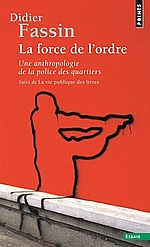
La Force de l’ordre. Une anthropologie de la police des quartiers, Seuil, Paris, 2011, 408 pages. Second edition with postface, 2015.
Depuis trois décennies, tous les désordres urbains qu’a connus la société française sont survenus à la suite d’interactions meurtrières entre la police et les jeunes dans des quartiers dits sensibles. Mais au-delà de ces moments dramatiques, quels sont les rapports entre les forces de l’ordre et les habitants des banlieues? Pour le comprendre, l’auteur a partagé pendant près de deux ans le quotidien d’une brigade anti-criminalité de la région parisienne. Cet ouvrage est le fruit de son enquête, la première du genre en France. Loin des imaginaires que nourrissent le cinéma et les séries télévisées, il raconte le désœuvrement et l’ennui des patrouilles, la pression du chiffre et les doutes sur le métier, les formes invisibles de violence et les manifestations méconnues des discriminations. Inscrivant ces pratiques policières dans les politiques qui les rendent possibles, il montre qu’elles visent moins à protéger l’ordre public qu’un certain ordre social et dévoile ainsi l’exception sécuritaire à laquelle sont soumises les cités.
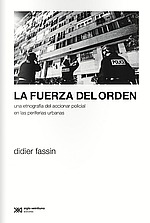
La fuerza del orden: Una ethnografía del accionar policial en las periferias urbanas, Siglo XXI, Buenos Aires, 2016, 326 pages, translated by Andrea Sosa Varrotti.
Durante las últimas décadas, la policía de numerosos países se convirtió en objeto de debates públicos en relación con abusos de poder, violaciones del derecho, brutalidad y discriminación. Estas prácticas, que en general recayeron sobre hombres jóvenes de sectores populares, dieron lugar a protestas e incluso revueltas. Sin embargo, fuera del interés que estos episodios generan en periodistas y criminólogos, poco se sabe del accionar cotidiano de la policía. Para comprender las interacciones concretas de sus agentes con parte de la población más marginada, el autor compartió durante quince meses la rutina de las brigadas anticriminalidad en los suburbios parisinos. Este libro es el resultado original y sorprendente de ese acercamiento etnográfico. Revela el peso de los tiempos muertos y el tedio del patrullaje en los barrios, la presión para lograr objetivos prácticamente inalcanzables en términos de casos resueltos, la incidencia de políticas que otorgan poderes arbitrarios a los agentes, la banalización de humillantes detenciones y cacheos, y la espiral de violencia que se desencadena como consecuencia del uso excesivo de la fuerza policial.
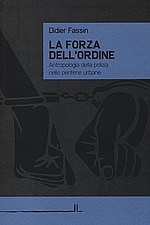
La forza dell'ordine. Antropologia della polizia nelle periferie urbane, La Linea, Bologna, 2013, 351 pages, translated by Lorenzo Alunni.
Spesso, negli ultimi anni, le periferie delle metropoli occidentali sono state il teatro di scontri tra le forze di polizia e gli abitanti, per lo più giovani di origini straniere. Nel 2005 è stato il turno delle maggiori città francesi. Didier Fassin, con un’etnografia incentrata su un corpo “speciale” di polizia dell’area urbana di Parigi, ci dà un resoconto illuminante del fenomeno. Ne descrive la quotidianità fatta d’inattività e di noia, ma mostra anche la costante ricorrenza di umiliazioni, violenze e discriminazioni nei confronti delle minoranze etniche e degli immigrati. L’analisi ci svela come, in un contesto di crescenti disparità e tensioni razziali, lo Stato tenda ad agire per rafforzare l’ordine sociale vigente piuttosto che per difendere l’ordine pubblico.
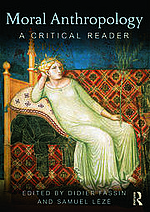
Moral Anthropology: A Critical Reader (with Samuel Lézé), Routledge, New York, 2014, 388 pages.
Morality and ethics are increasingly invoked in the most diverse domains, from politics to economics, from war to sexuality, from international justice to biological research. To interpret this phenomenon from a critical standpoint, anthropology offers unique perspectives. This volume includes classical as well as recent material and sheds light on continuing debates about relativism and universalism, values and emotions, moral duty and ethical freedom, human rights and humanitarianism, the responsibility of the researcher and the regulation of research.
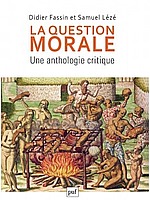
La question morale. Une anthologie critique (avec Samuel Lézé), Presses Universitaires de France, Paris, 2013, 624 pages.
La morale et l’éthique sont aujourd’hui invoquées dans les domaines les plus variés, qu’il s’agisse de politique ou d’économie, de guerre ou de sexualité, de justice internationale ou de recherche biologique. Si ces préoccupations ne sont pas entièrement neuves, la manière de les constituer collectivement en problèmes et d’en débattre dans l’espace public implique désormais un certain rapport aux valeurs et aux émotions qui définit ce qu’on peut appeler la question morale. Pour l’explorer, ce livre propose un détour anthropologique. Du classique essai de Montaigne sur les cannibales aux travaux récents sur la science, la religion, l’humanitaire, la corruption ou les attentats suicides, les textes réunis, dont beaucoup sont inédits en français, présentent les grands débats contemporains autour du relativisme et de l’universalisme, du devoir moral et de la liberté éthique, de la responsabilité du chercheur et de la régulation de la recherche. Ainsi, d’horizons exotiques en rivages familiers, cette anthologie critique, la première réalisée sur ce thème, permet de penser à nouveaux frais des enjeux que nos sociétés tendent trop souvent à traiter de façon passionnelle et intuitive, au risque de la simplification et de l’ethnocentrisme.
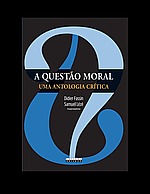
A questão moral - Uma antologia crítica, Unicamp, Campinas, Brazil, 2018, 560 pages, translated by Lara Christina de Malimpensa.
Se a antropologia está sempre discutindo a moral, poucos auto- res tentaram teorizar a “questão moral” em si mesma. Contudo, sua onipresença contemporânea demanda nossa reflexão sobre esse impensado das ciências sociais. Problematizar as diversas dimensões da moral é o propósito desta antologia crítica, que reúne, traduz e apresenta textos que balizam um campo de pes- quisa em pleno desenvolvimento: a antropologia moral. A obra é composta por cinco partes, cada uma associada a uma discussão crítica. O conjunto restabelece a genealogia que leva a filosofia moral à constituição de uma ciência moral e social; reúne as principais tentativas antropológicas de pensar a mo- ral, entre relativismo e universalismo; desenvolve os conceitos importantes de morais locais e de economias morais; analisa o encontro entre os antropólogos e a moral tal como eles a des- cobrem durante suas pesquisas; explicita, enfim, a ética da an- tropologia e os paradoxos morais das codificações éticas atuais.
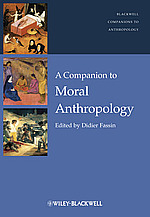
Moral Anthropology(editor), Wiley-Blackwell, series Companion, Malden, MA, 2012, 664 pages.
Moral questions have always been at the heart of the project of the social sciences. Yet, it is only in recent years that a field of research has been developed in the anthropology of morality and ethics. Bringing together international experts from this emerging domain, the book provides original essays exploring the various currents, approaches, and issues in the ethnography of moralities, the study of ethical subjectivities, and the exploration of moral economies, based on fieldwork conducted on the five continents. The frontiers with politics, law, religion and science receive a special attention, as well as the problems of violence and war, the contemporary rise of humanitarianism and human rights, and the debates about relativism and universalism. A final dialogue is engaged with neighboring disciplines that adopt very distinct paradigms such as moral philosophy, moral psychology, evolutionary biology and neuroethics.
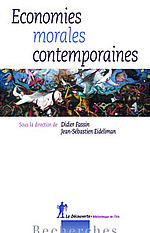
Economies morales contemporaines(editor, with Jean-Sébastien Eideliman),La Découverte, Paris, 2012, 405 pages.
Les questions morales pénètrent nos représentations, nos pratiques, nos politiques. Redonnant toute sa force critique au concept d’économies morales, les auteurs en explorent les multiples facettes à travers une série d’enquêtes conduites sur quatre continents. Des lieux d’enfermement des étrangers en France aux prisons de haute sécurité aux Etats-Unis, de la stigmatisation des familles roms en Italie à la marginalisation des enfants de migrants en Chine, de la condamnation du tourisme sexuel en Thaïlande à l’évaluation des transactions amoureuses au Mali, des pratiques de charité en Inde aux politiques contre la pauvreté au Chili, les auteurs s’attachent à comprendre comment on gouverne et on juge, comment on assiste et on exclut. Mais ils montrent aussi que les professionnels et leurs publics n’adoptent pas de manière passive et uniforme ces modèles moraux, déployant des subjectivités éthiques pour résister ou faire avec, autour du handicap et de la toxicomanie, de l’asile et de la naturalisation, de la violence et de la finance. Cet ouvrage nous propose ainsi de penser la vie sociale et politique de la morale.
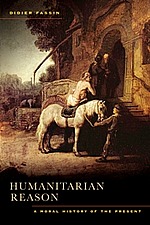
Humanitarian Reason. A Moral History of the Present, University of California Press, Berkeley, 2011, 336 pages, translated by Rachel Gomme (received the Honorable Mention for the Bateson Prize of 2012 by the Society for Cultural Anthropology).
In the face of the world’s disorders, moral concerns have provided a powerful ground for developing international as well as local policies. This book draws on case materials from France, South Africa, Venezuela, and Palestine to explore the meaning of humanitarianism in the contexts of immigration and asylum, disease and poverty, disaster and war. It traces and analyzes recent shifts in moral and political discourse and practices — “humanitarian reason”— and shows in vivid examples how humanitarianism is confronted by inequality and violence. Deftly illuminating the tensions and contradictions in humanitarian government, the studies presented reveal the ambiguities confronting states and organizations as they struggle to deal with the intolerable. This critique of humanitarian reason, respectful of the participants involved but lucid about the stakes they disregard, offers theoretical and empirical foundations for a political and moral anthropology.
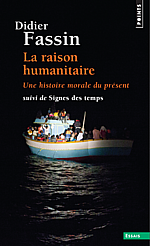
La Raison humanitaire. Une histoire morale du présent, Gallimard-Seuil, Paris, 2010, 358 pages. Second edition with postface, 2018.
Face aux désordres du monde, les sentiments moraux sont devenus un ressort essentiel des politiques, internationales aussi bien que locales. Qu’il s’agisse de conduire des actions en faveur des pauvres ou des réfugiés, d’aider des victimes de catastrophes ou de justifier des interventions militaires, un gouvernement humanitaire, mêlant solidarité et compassion, se déploie partout au secours des démunis et des dominés. C’est à l’analyse de cette nouvelle économie morale qu'est consacré ce livre. Analysant en France l’ouverture de lieux d’écoute dans les banlieues, la distribution d’aides d’urgence aux chômeurs, la régularisation des étrangers en situation irrégulière et le traitement des demandes d’asile, mais étudiant aussi les représentations de l’enfance au temps du sida en Afrique du Sud, les témoignages sur les traumatismes dans les Territoires palestiniens, les opérations de sauvetage de sinistrés au Venezuela et les choix difficiles de l’aide internationale lors de l’invasion de l’Irak, Didier Fassin livre les fragments d’une histoire au présent de la manière dont les sociétés contemporaines font face à l’intolérable.
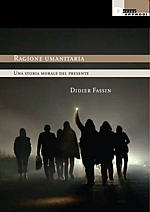
Ragione umanitaria. Una storia morale del presente, Derive Approdi, Rome, 2018, 311 pages, translated by Lorenzo Alunni.
I sentimenti morali sono diventati uno strumento politico fondamentale per rispondere ai disordini del mondo. Che si tratti di gestire poveri e rifugiati, di soccorrere le vittime di catastrofi o di giustificare interventi militari, a dispiegarsi è sempre quel governo umanitario del quale l’autore analizza le premesse, le tensioni e le contraddizioni. Dalla Francia al Sudafrica, dal Venezuela alla Palestina, l’antropologo e sociologo esplora alcune scene globali in cui la ragione umanitaria è messa alla prova dalla disuguaglianza, dalla violenza, dal dolore. Emerge una nuova economia morale del mondo contemporaneo, della quale l’autore propone una critica allo stesso tempo rispettosa dell’impegno delle figure coinvolte e capace di leggere con lucidità le questioni che le sovrastano.
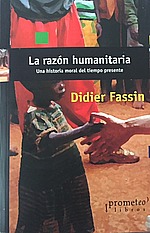
La razón humanitaria. Una historia moral del tiempo presente, Prometeo Editorial, 2016, 396 pages.
Los sentimientos morales resultan ser una energía esencial de las políticas contemporáneas: ellos nutren los discursos y legitiman las prácticas, especialmente cuando estas se dirigen a los desposeídos y a los dominados -que pertenecen a un mundo cercano (los pobres, los extranjeros enfermos, las personas sin vivienda) o lejano (las víctimas del hambre, de las epidemias, de las guerras). En ese contexto, el “gobierno humanitario” es el despliegue de los sentimientos morales en las políticas contemporáneas. Gobierno debe entenderse aquí en sentido amplio,como el conjunto de dispositivos establecidos y de las acciones realizadas para administrar, regular, favorecer la existencia de los seres humanos; el gobierno incluye, pero sobrepasa la intervención del Estado, de las colectividades territoriales, de los organismos internacionales y generalmente, de las instituciones políticas.
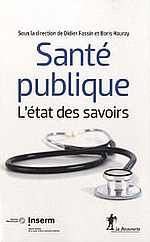
Santé publique. L’état des savoirs(editor, with Boris Hauray), La Découverte, Paris, 2010, 536 pages.
Depuis deux siècles, la santé publique a vu son territoire s’étendre et sa légitimité se conforter dans l’action de l’État aussi bien que dans les pratiques des citoyens. Ébranlée par des crises sanitaires, mais renforcée par de nouveaux savoirs et de nouvelles institutions, elle est devenue un enjeu majeur. C’est à en décrypter les multiples facettes, des disciplines qu’elle mobilise aux problèmes et aux défis auxquels elle est confrontée, qu’une soixantaine de chercheurs et praticiens s’emploient dans ce livre dont les inégalités devant la vie constitue le fil rouge. During the past two centuries, the territory and legitimacy of public health have been comforted in the action of the state as well as the practices of citizens. Shaken by unprecedented epidemics and crises, but strengthened by new knowledge and new institutions, public health has become a major issue. It is to decipher its multiple aspects, from the disciplines it mobilizes to the problems and challenges it faces, that sixty researchers and practitioners combined efforts in this volume, whose thread follows the inequalities in the face of life.
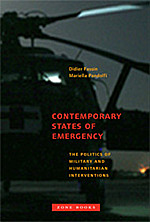
Contemporary States of Emergency. The Politics of Military and Humanitarian Interventions(editor, with Mariella Pandolfi), Zone Books, New York, 2010, 408 pages, 2nd edition 2013.
From natural disaster areas to zones of conflict around the world, a new logic of intervention has emerged, combining military action and humanitarian aid, conflating moral imperatives and political arguments, and confusing the concepts of legitimacy and legality. The mandate to protect human lives, however and wherever endangered, has thus promoted a new form of military and humanitarian government that operates in a temporality of urgency, moving from one crisis to the next, applying the same battery of technical expertise, and justifying itself in terms of lives to be rescued and suffering to be alleviated. Drawing on the critical insights of anthropologists, legal scholars, political scientists, and practitioners from the field, this book addresses a critical question that confronts the world today: How and why have military and humanitarian interventions transformed the international order such that what was once a logic of exception has now become the rule of contemporary global politics?
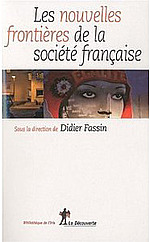
Les nouvelles frontières de la société française (editor), La Découverte, Paris, 2010, 599 pages (awarded the France Culture Prize of the Best Essay in 2010), 2nd edition with new preface 2012.
Au cours des dernières décennies, les frontières du territoire français se sont refermées pour les étrangers en provenance des pays non communautaires. Mais simultanément, d'autres frontières moins visibles, raciales, ethniques ou religieuses, se sont constituées à l'intérieur de l'espace national. Longtemps pensées séparément, les unes à travers la «question immigrée», les autres en termes de «racialisation», ces frontières sont étroitement liées, tant dans les histoires familiales que dans les discours publics. Résultat de quatre années d'enquêtes pluridisciplinaires, cet ouvrage met au jour les transformations contemporaines des identités et des altérités dans la société française. In the past decades, the French borders have become increasingly impervious to immigrants originating from outside Europe. But simultaneously, less visible racial, ethnic, and religious boundaries have been drawn within the nation. Long considered separately, the former through migration, the latter via racialization, these lines of divide are in fact closely related in family histories as well as public discourses. The result of four years of pluridisciplinary research, this volume unveils the changes in the construction of identities and of otherness in France.
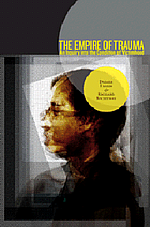
The Empire of Trauma: An Inquiry into the Condition of Victimhood(with Richard Rechtman), Princeton University Press, Princeton, 2009, 305 pages, translated by Rachel Gomme (awarded the Douglass Prize for the Best Book of 2010 in the Anthropology of Europe).
Today we are accustomed to psychiatrists and psychologists taking care of victims at the scenes of natural disasters, terrorist attacks, war zones, but also the suicide of an adolescent and other such personal tragedies – yet it has not always been so. The very idea of psychic trauma came into being only at the end of the nineteenth century and for a long time was treated with suspicion. This book tells the story of how the traumatic victim became culturally and politically respectable, and how trauma itself became an unassailable moral category. Basing their analysis on a wide-ranging ethnography, the authors examine the politics of reparation, testimony, and proof, at work respectively in the application of psychiatric victimology to the population affected by the 2001 industrial disaster in Toulouse; the involvement of humanitarian psychiatry with Palestinians and Israelis during the second Intifada; and the deployment of the psychotraumatology of exile for asylum seekers. Revealing how trauma has come to authenticate the suffering of victims, they provide a critical perspective on contemporary moral and political issues raised by the condition of victimhood.
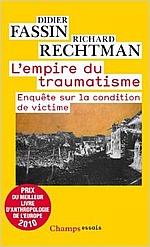
L’Empire du traumatisme. Enquête sur la condition de victime(avec Richard Rechtman), Flammarion, Paris, 2007, 452 pages, 2nd edition with new preface 2011.
Des attentats aux catastrophes naturelles, des accidents d’avion aux prises d’otages, des massacres de populations aux suicides d’adolescents dans des lycées, chaque événement violent appelle la présence de psychiatres et de psychologues qui interviennent pour prendre en charge les traumatismes. Longtemps cette notion a servi à disqualifier soldats et ouvriers dont on mettait en doute l’authenticité de la souffrance. Désormais, grâce au traumatisme, les victimes trouvent une reconnaissance sociale. A travers trois enquêtes sur la victimologie psychiatrique dans les suites de l’explosion de l’usine AZF à Toulouse, sur la psychiatrie humanitaire dans les territoires palestiniens durant la seconde Intifada et sur la psycho-traumatologie de l’exil à l’œuvre auprès des demandeurs d’asile, émergent trois politiques - de la réparation, du témoignage et de la preuve. Le traumatisme n’est ainsi pas seulement une donnée psychologique : il est aussi une ressource sociale. Mais s’il permet de défendre des causes, de revendiquer des droits, de justifier des actions, il conduit aussi à exclure des groupes humains, à occulter des inégalités sociales et à produire de nouvelles hiérarchies d’humanité.

L’impero del trauma: Nascita della condizione di vittima, Meltemi Publishing, 2020, translated by Luigigiovanni Quarta.
Dagli attentati ai terremoti, dagli incidenti aerei ai sequestri, dai massacri ai suicidi, ogni avvenimento violento invoca la presenza di psichiatri e psicologi che intervengono in nome della traccia psichica del dramma: il trauma. A lungo questa nozione è servita a squalificare
soldati e operai della cui sofferenza si metteva in dubbio l’autenticità. Oggi, grazie al trauma, le vittime trovano un riconoscimento sociale. E proprio sulla condizione delle vittime si concentrano le analisi di Fassin e Rechtman, tra i principali antropologi contemporanei.
L’impero del trauma delinea l’appassionante percorso che dai lavori di Charcot, Janet e Freud giunge all’invenzione del disturbo post-traumatico da stress negli Stati Uniti, fino all’attuale era di riabilitazione che produce l’apparizione di una nuova soggettività politica: quella della vittima.
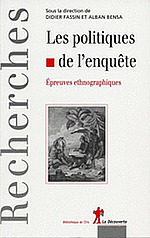
Les Politiques de l’enquête. Épreuves ethnographiques(editor, with Alban Bensa), La Découverte, Paris, 2008, 338 pages.
S'il fut jamais un temps où l’ethnographie allait de soi, tel n’est plus le cas. C’est de cette illusion perdue qu’est née l’idée de ce livre. Non pour regretter une époque qui a surtout existé dans l’imaginaire des anthropologues, mais pour saisir les implications épistémologiques, éthiques, politiques de l’enquête de terrain aujourd’hui. Fruit d’un travail collectif conduit sur trois continents, cet ouvrage plaide ainsi pour une manière réflexive et critique de répondre de sa recherche, dans un contexte où la place des sciences sociales est un enjeu crucial. If there was ever a time when ethnography could be taken for granted, it has long been forgotten. This book was born from this lost illusion – not to regret an epoch which has mostly existed in the imaginary of anthropologists, but to apprehend the epistemological, ethical and political implications of fieldwork today. The product of a collective reflection conducted on three continents, this volume pleads in favor of a reflexive and critical approach to the question of the responsibility and accountability of the researcher, in a context where the place of social sciences is crucial.
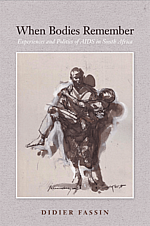
When Bodies Remember. Experience and Politics of AIDS in South Africa, University of California Press, Berkeley, 2007, 365 pages, translated by Amy Jacobs and Gabrielle Varro.
With six million of its population infected with HIV, South Africa is the country most affected by the AIDS epidemic worldwide. It is also where the most impassioned debates on the causes and treatments of the disease, the most spectacular mobilizations and trials for drug access have taken place. The result of five years of research in the townships and former homelands as well as in the scientific and political circles in South Africa, this book traces the political stakes of an epidemiological crisis that challenges both scientific discourses and public policies. It shows how the history of colonization and segregation remains alive in the inequalities and violence, racism and accusations of racism. It is therefore necessary to apprehend, in the most literal sense, how bodies remember. Beyond the specificity of the South African case, the volume proposes a reflection on the memory of collective afflictions in contemporary societies and on the political anesthesia produced by the indifference toward these injustices.
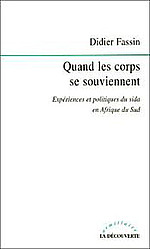
Quand les corps se souviennent. Expériences et politiques du sida en Afrique du Sud, La Découverte, Paris, 2006, 442 pages.
Avec six millions de personnes infectées, l’Afrique du Sud est le pays du monde le plus gravement touché par l’épidémie de sida. Elle est aussi le lieu des débats les plus virulents sur les causes et les traitements de la maladie, des mobilisations les plus spectaculaires et des procès les plus retentissants pour l’accès aux médicaments. Résultat de cinq années d’enquête dans les townships et les anciens homelands comme dans les milieux savants et politiques sud-africains, ce livre retrace les enjeux politiques d’une crise épidémiologique qui met en cause les discours de la science autant que la gestion du pouvoir : il montre comment l’histoire de la colonisation et de la ségrégation demeure vivante, dans les inégalités et les violences, dans le racisme et les accusations de racisme. Il s’agit donc de comprendre, de la manière la plus littérale, comment les corps se souviennent. Au-delà de la singularité historique de l’Afrique du Sud, l’ouvrage propose une réflexion sur la mémoire des afflictions collectives dans les sociétés contemporaines et sur l’anesthésie politique que perpétue notre indifférence à l’égard de ces injustices.
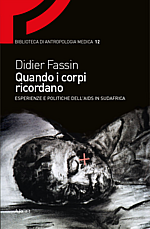
Quando i corpi ricordano. Esperienze e politiche del l'aids in Sud Africa, Argo, 2016, 384 pages, translated by Lorenzo Alunni.
All’inizio degli anni Duemila, mentre si scatenava un’aspra polemica sulle cause e le cure di questa malattia, il Sudafrica è diventato la nazione con il più alto numero di malati di Aids al mondo. Frutto di cinque anni di ricerca nelle township e nelle ex homeland, ma anche negli ambienti scientifici e politici, il autore ricostruisce lo sviluppo di una crisi epidemiologica e politica senza precedenti che, nel contesto del post-apartheid, ha scosso il rapporto fra sapere e potere. Mentre la storia della segregazione razziale si perpetua nelle violenze e nelle disuguaglianze di oggi, questo libro mostra come il lavoro della memoria delle sofferenze collettive faccia rivivere negli eventi del presente le tragedie del passato. Con una riflessione che va al di là del caso sudafricano, l’autore indaga i modi in cui, nelle società contemporanee, i corpi ricordano.
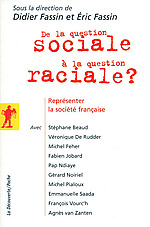
De la question sociale à la question raciale? Représenter la société française, (editor, with Éric Fassin), La Découverte, Paris, 2006, 274 pages, 2nd edition with new preface 2012.
A l'ombre des émeutes urbaines de l'automne 2005, c'est la représentation d'une France racialisée qui s'est imposée dans le débat public. On n'ignorait pas le racisme; on découvre combien les discriminations raciales, dans l'emploi, le logement et à l'école, face à la police et à la justice, structurent des inégalités sociales. En retour, se font jour des identifications ainsi que des tensions dans le langage politique de la race, naguère encore interdit de cité. Les études réunies dans ce livre composent un éloge de la complexité, autour d'un engagement problématisé : comment articuler, plutôt que d'opposer, question sociale et question raciale? In the wake of the urban riots in the fall of 2005, it is the representation of a racialized France that has been imposed in the public debate as people realized how much racial discrimination in employment practices, housing, and schools, in interactions with the police as well as the courts, structures social inequalities. But simultaniously identifications as well as tensions in the political language of race, until then repressed, have come to light. The studies collected in this book account for the complexity of the problem: how to link rather than oppose the social and racial questions?
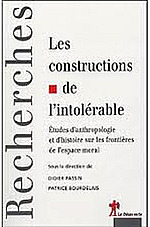
Les Constructions de l’intolérable. Etudes d’anthropologie et d’histoire sur les frontières de l’espace moral(editor, with Patrice Bourdelais), La Découverte, Paris, 2005, 226 pages.
Torture, abus sexuels, maltraitance des enfants, traite des esclaves, crimes de guerre, génocides: les figures de l’intolérable se sont multipliées depuis deux siècles. Ce que l’on affirme ainsi injustifiable est vu comme un mal radical, voire absolu. Pourtant, le regard vers un passé encore proche nous apprend que les intolérables sont historiquement constitués. Contre une vision essentialiste des droits de l’homme, les études présentées dans ce livre rendent compte de la formation des frontières de l’espace moral contemporain, tout en interrogeant notre tolérance à l’égard des inégalités et des injustices. Torture, sexual violence, child abuse, slave trade, war crimes, genocides: the figures of the intolerable have multiplied during the past two centuries. What appears as unjustifiable is represented as a radical or even absolute evil. Yet the exploration of the recent past suggests that the intolerable is historically constituted. In contrast with an essentialist vision of human rights, the studies presented in this book account for the formation of the frontiers of the contemporary moral space, while questioning our tolerance toward inequalities and injustices.
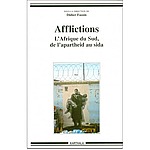
Afflictions. L'Afrique du Sud, de l'apartheid au sida(editor), Éditions Karthala, Paris, 2004, 304 pages.
Comprendre la crise épidémiologique que connaît aujourd'hui l'Afrique du Sud et le drame social auquel elle donne lieu suppose de penser les événements à la lumière d'une histoire qui fournit à la fois les conditions objectives de la progression de l'infection et la trame narrative à partir de laquelle les acteurs l'interprètent. Contre les lectures oublieuse de l'héritage de la domination coloniale puis de l'apartheid, il s'agit donc de rappeler cette présence du passé dans les inégalités de distribution de la maladie et dans les arguments échangés au cours de la polémique, dans l'expérience quotidienne des habitants des townships comme dans la mémoire affleurant sans cesse dans l'espace public. To understand South Africa’s current epidemiological crisis and the social upheaval which it has brought about supposes that the events be seen in light of a history which supplies both the objective conditions for the infection’s spread and the narrative through which the actors interpret it. As opposed to readings that deliberately overlook the legacies of colonial domination and then apartheid, the book recalls this presence of the past in the inequalities of the disease’s distribution and in the arguments bandied about in the course of the debate, in the daily experiences of those living in the townships as well as in the memory constantly emerging in the public space.
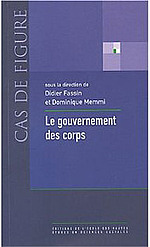
Le Gouvernement des corps (editor, with Dominique Memmi), Éditions de l’École des Hautes Études en Sciences Sociales, Paris, 2004, 269 pages.
Le gouvernement des corps se manifeste dans le domaine médical à travers l’éducation pour la santé, les politiques du médicament, la régulation de l’interruption de grossesse et de la gestion de la mort, mais aussi de manière plus diffuse avec le contrôle de la prostitution, l’imposition de normes conjugales, l’administration du monde carcéral, ou la normalisation des conduites des pauvres et des immigrés. Ce livre traite ainsi des multiples manières dont la société se saisit du corps, de la vie et du vivant, en définit les limites et les usages légitimes, dessinant les contours de nouvelles biopolitiques. The government of bodies manifests itself in the medical field via health education, drug policies, regulation of abortion and assistance in dying, but also more broadly through the control of prostitution, the imposition of conjugal norms, the administration of the carceral institutions or the normalization of conducts of the immigrants or the poor. This book thus deals with the multiple ways by which society apprehends the body, the living and life, defines its limits and legitimate uses, drawing the contours of new biopolitics.